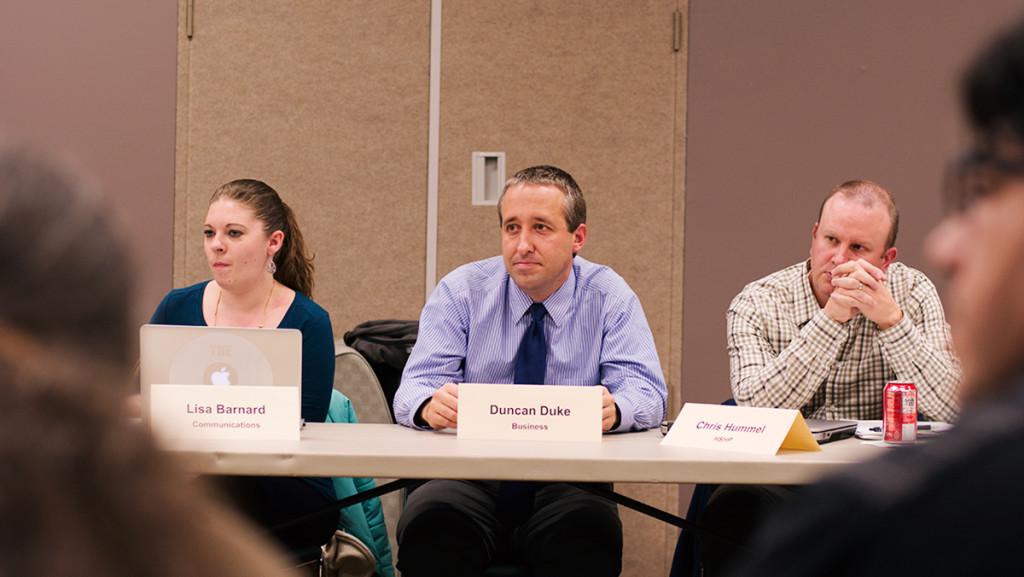The Ithaca College Board of Trustees asked the Faculty Council to pick two faculty members to serve on a task force evaluating the governance structure at the college.
The directive, posed during a meeting Dec. 1, asks faculty, staff, students and Benjamin Rifkin, provost and vice president of educational affairs, to review systems of governance at the college and propose enhancements.
Rifkin said the creation of the task force came out of members of the college feeling that they were not being sufficiently represented. He said the task force would begin working in the spring semester, meeting about two times a month, and would be tasked with creating a preliminary evaluation of governance at the college in May.
Stanley Seltzer, associate professor in the Department of Mathematics, and John Rosenthal, professor in the Department of Mathematics, said they’re worried the task force will be ineffective because similar task forces in the past that evaluated Shared Governance were not as effective as hoped.
Deborah Rifkin, associate professor of music theory, history and composition, said there is a problem of governance on campus, and it needs to be addressed.
“There’s a general consensus that there is a communication and decision–making problem on campus … I see this as a friendly overture by the board of trustees that this is a problem,” Rifkin said.
David Turkon, associate professor and chair of the Department of Anthropology, said he wants the board of trustees to also be evaluated as a governance structure.
“If we are moving forward, I want assurance from the board to come under scrutiny as well,” Turkon said.
The council decided to put out a call for nominees to fill two faculty positions on the task force for one week. The Faculty Council will review a list of candidates, and the council’s executive committee will choose the two best members who represent faculty and the college.
The council also discussed the Academic Policies Committee policy to ensure that no one-section required courses be scheduled in the 4–6 p.m. time frame to allow sports practices to happen during that time and reduce scheduling conflicts. If needed, a course can still be scheduled at this time, but it has to be overridden by the dean of the school that it is being offered in.
After analyzing information gathered by the registrar about how many courses would be affected, Peter Rothbart, chair of Faculty Council, said there’s no way to tell how many students could be affected by the policy due to the complication of not knowing how many of those students are athletes.
The council made a motion to amend the policy to include that this rule can be put in place as long as it can be re-evaluated in two years. Now the amended policy will be sent back to the APC to be approved, and if approved sent on to the President’s Council to be approved.
Rothbart also asked for Faculty Council volunteers to field questions at roundtable discussions concerning recent events on campus. The discussions are being held 4–6 p.m. Dec. 2 in the Clarke Lounge and 5–7 p.m. in the Taughannock Falls Room. The discussions are only open to faculty.
“I just care that there’s discussion. I don’t care about the content,” Rothbart said. He said he wants the discussion to be an informal one and a place where faculty can go to get information about what’s happening on campus.
The council also held a preliminary discussion about student evaluations of professors potentially being held online schoolwide.
Rifkin said at the previous institution he was employed at, they held all student evaluations online. He said this process provided more instant feedback for professors, students’ handwriting didn’t give away their identity when critiquing professors on paper, and by going online, the school saved money on paper and manpower.
Duncan Duke, assistant professor of management, said in the business school, response rates dropped when they transferred to online evaluations because students weren’t expected to turn in a tangible copy of the evaluation.
Lisa Barnard, assistant professor of strategic communication, said for strategic communication in the Park School, the evaluations have a 85–90 percent completion rate because students get time in class to fill out the surveys and they receive reminder emails.
The council will continue to gather information about potentially transferring all student evaluations online.








